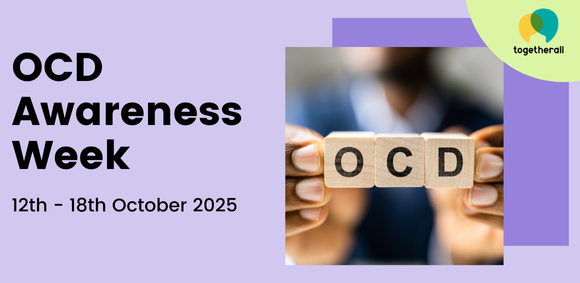OCD awareness week is an annual event held in the second full week of October to educate people about obsessive-compulsive disorder (OCD), break stereotypes and encourage those affected to seek help. Let’s take this opportunity to learn more about OCD and challenge common misconceptions.
What is obsessive compulsive disorder?
OCD is often a misunderstood condition, that can sometimes be reduced to jokes about being neat or organised. But in reality, OCD is a far more challenging and complex condition. It is characterised by a pattern of unwanted and intrusive thoughts (obsessions) and repetitive behaviours (compulsions) performed in an attempt to alleviate anxiety caused by these thoughts.
Obsessions: These are persistent and unwanted thoughts, urges or images that cause significant anxiety or distress. Common obsessions include fears of contamination, harm to oneself or others, unwanted sexual thoughts or a need for symmetry and order.
Compulsions: These are repetitive behaviours such as cleaning, checking, counting, arranging items in a specific way, praying, rewriting, mental rituals.
OCD can significantly disrupt daily life, impacting work, school, relationships, and overall wellbeing. The constant struggle with intrusive thoughts and time-consuming compulsions can lead to isolation, depression, and a diminished quality of life.
Why OCD awareness matters
Raising awareness about OCD is essential for several reasons, including:
- Breaking down stigma: Increasing the public understanding of OCD helps combat stereotypes that lead to stigma and isolation for those with this condition.
- Empathy and support: Understanding OCD allows others to empathise with their loved ones and create an environment where there supported.
- Highlighting effective treatments: OCD awareness week is an opportunity to highlight the different treatment options for OCD. Such as cognitive behavioural therapy (CBT), exposure and response prevention and medication. These treatments can significantly reduce symptoms and improve quality of life.
- Raising awareness can help you detect OCD in others or yourself, leading to an earlier diagnosis and treatment options.
- Advocating for resources: Awareness campaigns can help advocate for increased funding for research, treatment, and support.
How you can get involved
- Learn more about OCD by reading through sites like the International OCD Foundation.
- Support OCD organisations by donating, spreading awareness and volunteering with organisations that provide support and resources to people with OCD.
- Spread awareness by sharing information on social media.
- Start conversations about OCD with friends, family, and colleagues.
In conclusion, OCD awareness week is a vital opportunity to educate, support and advocate for those effected by obsessive compulsive disorder. Join us in spreading the word and making a positive impact during OCD awareness week.
Support and resources for CAW students
As a student of The College of Animal Welfare, you get FREE access to a wide variety of resources and support via the togetherall app; there is a great short online course on how to manage OCD. Togetherall also has forums so you can discuss any worries with others, and access to trained counsellors 24/7. If you haven’t set up an account, you can do so FREE of charge with your CAW email address.
If you are struggling with your mental health or any aspect of college life, remember you can access up to six confidential counselling sessions free of charge: full details can be found here.

